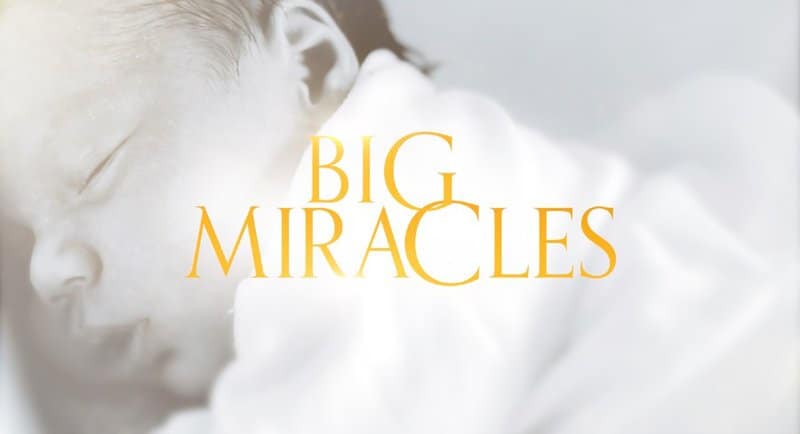Each year, one in six Australians will experience infertility.
With more people than ever before seeking the help of fertility specialists to start a family, Big Miracles follows people going through IVF as they experience the highs and lows of trying to fall pregnant.
Produced by Ronde Media for Channel Nine, the show looks at the experiences of a range of people – from women with endometriosis, to men with low sperm counts, and same-sex couples who are relying on surrogacy.
Mediaweek spoke to Ronde Media’s Ben Davies and Liam Taylor about producing the show, ahead of its premiere at 9pm Monday, February 6th, on Channel Nine and 9Now.
Narrated by Lisa McCune – a woman that Davies describes as someone with a “natural ability to get the nuances of the storytelling, and translate that through her narration reads” – Big Miracles originally began as an idea from someone on the frontline.
Davies: “There was a woman who works at an IVF clinic, Teena Pisarev, she was saying ‘there’s a lot going on here, these stories would be great to tell so the public better understands IVF and the stigmas attached to it. Does anyone know a TV producer?’
“One of the other women has a father who is a retired doco maker. She asked him and he said to get in touch with Ronde – they did, and then we spoke to Nine and it went from there.”
The show follows 10 individuals and couples who are trying to fall pregnant with the odds stacked against them. When it came to selecting the participants, the pair say that there were a few major points they were looking out for.
Davies: “You’re looking for struggle because there’s a natural story, and you’re looking for people who have the resilience to persevere through the struggle. Beyond that, we’re looking at things like class, ethnicity, personality, and diversity of gender and sexuality.”
Taylor: “One thing that was really telling is that we didn’t have to look hard to get the diversity. That’s quite pivotal as a theme in the series – infertility can affect anyone, it doesn’t discriminate.”

Appearing on national TV for any reason can be daunting enough, let alone for something as personal as infertility. For the people who tell their stories on Big Miracles, reflecting the reality of their lives was worth it.
Davies: “It’s driven by the women who want to share how challenging the journey is, that seems to be the thing that comes up over and over. There’s a willingness to say, ‘hey, I’m going through this. It’s tough. People don’t know how tough it is.’
“They’re looking to try and illustrate it themselves so that people can have a better understanding, and be more sympathetic to women going through it that aren’t on TV.”
Taylor: “It’s not so much breaking the stigma, but definitely raising the awareness of it – how tough it is, and how common it is.”
By definition, Big Miracles shows some very intimate moments as it follows people along their journey to become parents. With Davies and his wife having had three children of their own through IVF, he says that the shared experience meant that “there was a level of trust” between the subjects and storytellers right from the beginning.
Davies: “No one that we’ve filmed with has pulled out, so it’s a sign of the strength of the relationships between the producers and the on-screen contributors. I think it’s about honest portrayals – some of them were adamant, ‘don’t shy away from the raw moments’.”
As well as the participants, Big Miracles also follows the work of scientists, doctors, and other medical personnel, a group of people that Taylor describes as “pivotal.”
Taylor: “You’ve got two parties who share the same goal of creating families.
“For the patient cast, their stories are driven by sheer determination and a lot of emotion involved in trying to become parents. Then the fertility specialists, the embryologists, and the nurses are just so invested in their patients’ journeys. They’re the miracle makers, if you want to call them that, but they are pivotal to the series. Each patient has their own fertility specialists, and they step through the journey with them.”
When asked what the pair hopes that the audience gets out of Big Miracles and the bravery of its participants, the answer is “a true appreciation of the preciousness and the miracle that is life.”
Davies: “I’m getting a little bit cosmic, but the chances of life existing in the universe are so extraordinarily slim that there’s probably not enough room on a calculator screen. The fact that human life has evolved out of that, and the chances of being the individual who is born – it’s extraordinarily primitive and beautiful at the same time.”
Taylor: “It’s really intimate and raw and authentic, and a big part of that is the relationships we’ve built with the contributors – it’s been over 12 months for some of them, 14 months, 15 months for some. They’ve been so open, and we’re really privileged and lucky to be able to tell their stories. They’re really invested in it, and that’s what is going to make it so powerful for the viewers.”
